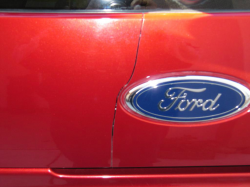
— A Ford Explorer cracked rear panel lawsuit is still in its early stages as Ford tries to convince the court that class-action certification should be denied. The proposed class-action lawsuit accuses Ford of selling the Explorer and two additional SUVs with defective rear panels, called appliques, that crack and cause the liftgate windows to chip and shatter.
The affected SUVs named in the cracked rear panel lawsuit are the 2002-2005 Ford Explorer, 2002-2005 Mercury Mountaineer and the 2003-2005 Lincoln Aviator. The lawsuit alleges even though Ford sold millions of those SUVs, consumers might not have purchased the SUVs if the defect had been known.
The plaintiffs argue Ford is trying to "redefine" the claims by making the alleged problem less serious than it is, calling the cracks a simple cosmetic problem. Although Ford says there is a "propensity of the applique to crack," the plaintiffs say there have been dangerous consequences from the cracked rear panels.
The lawsuit says corrosion is one of those dangers, including corrosion to steel components located under the cracked rear panels. The plaintiffs name a stud plate that attaches to the rear wiper motor as one example. According to the lawsuit, corrosion can affect not only the rear wiper motor mounted to the stud plate, but also a striker that latches the rear glass to the liftgate.
The applique was designed to prevent water from becoming trapped and pooling behind the panel by allowing water to drain through a series of "weep holes." The plaintiffs argue a crack in the rear panel does nothing but allow moisture to enter the rear panel and damage the underlying components.
According to the plaintiffs, the steel components under the rear panel have a single layer of electro-coating but not a multi-layer coating sufficient to protect the steel from prolonged contact with moisture. Additionally, the lawsuit says the increased moisture blocks the "weep holes" and keeps the steel components waterlogged. The result, according to the plaintiffs, are metal components that move and contact the rear glass, causing the glass to chip or shatter.
Other dangerous issues include the liftgate window shattering, the rear panel falling off while driving and the liftgate opening while driving.
Ford claims the material used for the rear panel is a proven reliable material called acrylonitrile butadiene styrene, or ABS, but the plaintiffs say it's practically useless on Ford tailgates. The lawsuit alleges the appliques were cracking on dealer lots before the SUVs were sold, leading to 177 warranty claims by the end of 2001. The suit also says by April 2003, the cracked rear panels turned into the most expensive warranty repair costs at over $1 million per quarter.
In 2003, Ford switched from ABS to Xenoy for the rear panel material but the plaintiffs claim it didn't prevent the panels from cracking.
Ford argues it didn't believe a crack in the material was, or could, create a safety issue, a stance the plaintiffs call willful ignorance by Ford management. The suit alleges technicians who performed repairs on the applique specifically mentioned a cracked or warped panel could cause the glass to break or the panel to fall off.
Additionally, the Ford plant vehicle team program manager even noted the applique was projected to see a 100 percent failure rate as a result of the design defect.
The automaker claims instances of glass falling out or breaking are caused by problems with a hinge and strut associated with a prior recall. However, the plaintiffs argue the reports about glass problems are associated with the cracked rear panels and Ford is in denial about the connection. Further, the lawsuit alleges many of the vehicles with broken liftgate glass showed no problems with the hinges or struts.
The plaintiffs allege Ford knew, or should have known about the design defect yet failed to take measures to address the defect. The suit also claims Ford cannot reasonably argue that an objective, reasonable consumer would not be deceived by the design defect.
The plaintiffs claim they have presented evidence of a design defect that affects a large group of consumers, one with safety-related consequences that Ford failed to disclose to buyers and lessees of its SUVs. A hearing is scheduled to be held on November 12, 2015, to determine if the lawsuit should be granted class-action certification.
The Ford cracked rear panel lawsuit was filed in the U.S. District Court, Northern District of California, San Francisco Division.
The plaintiffs are represented by Grant & Eisenhofer, P.A., Frank LLP, Bremer Whyte Brown & O'Meara, and Davis, Bethune & Jones, LLC.





